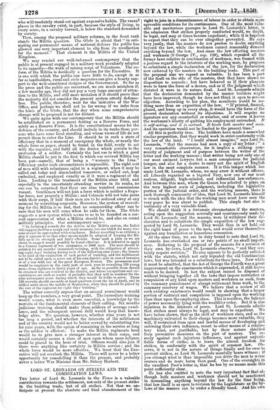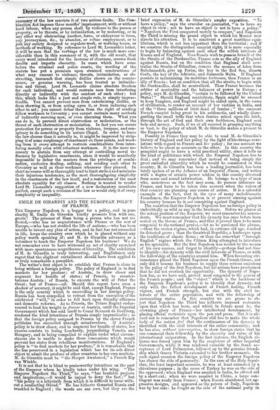LORD ST. LEONARDS ON STRIKES AND THE COMBINATION LAWS.
THE letter of Lord St. Leonards in the Times is a valuable contribution towards the settlement, not only of the present strike in the building trade, but of all strikes. Not that we an- ticipate at present the absolute and final abandonment of the right to join, in a discontinuance of labour in order to obtain more agreeable conditions for its continuance. One of the most valu-
able and meritorious passages in Lord St. Leonards's letter, is the admission that strikes properly conducted would, no doubt, be legal, and may at times become expedient; while it is hopeless to expect that they can be ever altogether prevented. He says very justly, that the masters do not profess to desire anything beyond the law, while the workmen cannot reasonably demand anything beyond the law. And since the law affecting masters and workmen (6 George IV., cap. 129), which repealed all the former laws relative to combination of workmen, was framed with a jealous regard to the interests of the working man, he proposes to substitute a simple declaration of the law, fin the declaration now enforced by the masters in the building trade. This part of the proposal also we regard as valuable. It has been a part of the fault on the side of the masters, that they have shown no disposition to concede ; but have behaved as if their pleasure were to have the force of a decree, and as if the iudgment which dictated it were in its nature final. Lord St. Leonards admits that the declaration demanded by the master builders might have been improved, though he does not think it open to serious objection. According to his plan, the manifesto would be no- thing more than an exposition of the law. " If printed, framed, glazed, and hung up in every shop, it would have the force of the present declaration without its objections. It will require no signature nor any counterfoil or number, and of course it leaves the workman's liberty of quitting his employment untouched. It is self-acting, and it is mutual. It binds both master and man. And its operation would not be limited to the present time." All this is perfectly true. The builders have made a somewhat similar proposition, that they would work in strict conformity with the law of the land. " I could almost imagine," says Lord St. Leonards, "that the masons had seen a copy of my letter ; " a very remarkable observation, for it implies a striking com- munity of judgment and of purpose between the writer of the letter and the working masons ; that writer being not only one of our most eminent lawyers but a man conspicuous for judicial temper, and also for a desire to carry out the spirit of English law in the most complete manner. It is this temper which has made Lord St. Leonards, whom, we may avow it without offence, all Liberals regarded tie a bigoted Tory, now one of our most zealous, diligent, high-minded, and influential law-reformers. And between this man, whom the Queen has selected to place on the very highest seats of judgment, including the legislative portion of the judicial order, and the working masons, there is such thorough community of idea, that Lord St. Leonards himself is struck with the idea that the working men must have seen the very paper he was about to publish. This simple fact also is testimony of a very valuable kind. We should think it a fortunate circumstance if the masters, acting upon the suggestion severally and spontaneously made by Lord, St. Leonardo and the masons, were t4 withdraw their de- claration and to substitute the simple exposition of the law sug- gested by Lord St. Leonardo. They would thus in act hold out the right hand of peace to the men, and would cover themselves against any humiliation or hazardous concession. At the same time, we are in duty bound to note that Lord St. Leonards has overlooked one or two points of no small import- ance. Referring to the proposal of the masons for a revision of their own by-laws, Lord St. Leonardo, observes, "and they cer- tainly require revision." He also appears to be perfectly satisfied with the statute, which not only repealed the old Combination laws, but was intended as a substitute for those laws. Now while it must be admitted, that the Act of George the Fourtliwas a great improvement on the enactments which it superseded, it still leaves much to be desired. In fact the subject cannot be disposed of without bringing together all the laws that impose restriction or compulsion of any kind upon masters and workmen as such, from the summary punishment of abrupt retirement from work, to the summary recovery of wages. We believe that a review of all such existing' enactments would result hi showing that a larger portion of restraint and compulsion is imposed upon the working class than upon the employing class. This is needless, the balance
of power necessarily lying with the wealthier order. But it is also injurious to the interests of peace. Lord St. Leonards admits that strikes must always be legal, and may be expedient. We have before shown, that as the skill of workmen rises, and as the machinery entrusted to their charge becomes more valuable, they will, if restrained from open and lawful means of developing and enforcing their own influence, resort to other means of a retalia- tory kind, not justifiable, but by their nature shielded from preventive measures on, the part of masters. The re- medy against such injurious influences, and against unjusti- fiable forms of strike, is to leave the utmost freedom for strikes, in conformity with the spirit of common law. Ob- serve, it is not in the nature of things finally and for ever to prevent strikes, as Lord St. Leonards manfully 'bears witness ; if you attempt what is thus impossible you drive the men to worse courses and do more harm than good. One of the oversights m. the excellent Peer's letter is, that he has by no means made this point sufficiently clear.
Be has also omitted to note the very important fact that al- though both masters and workmen should not be sanctioned in demanding anything beyond the law for the time being, that law itself is as open to revision by the Legislature as the by- laws of the masons can be under a friendly hand. And his own
summary of the law convicts it of two serious faults. The Com- bination Act imposes three months' imprisonment, with or without hard labour' when any person shall by violence to the person or property, or by threats, or by intimidation, or by molesting, or in any other way obstructing another, force, or endeavour to force any journeyman, &c., to abandon, or refuse employment, or b!. join any society designed to regulate work, or working hours, or methods of working. By reference to Lord St. Leonards's letter, it will be seen that the verbiage of the law is much more con- siderable than in this summary of it, with the old result, that every word introduced for the increase of clearness, creates fresh doubts and imports obsourity. In eases which have come before the criminal and police courts, the wording of the statute has put a premium upon strained constructions of what may i amount to violence, threats, intimidation, or ob- structing, insomuch that simple dislike shown on the counte- nance, or genuine warning, has been treated as intimida- tion and threat. Lord St. Leonards claims absolute freedom for each individual, and would restrain men from interfering directly or indirectly with the conduct of each other; but this, which looks like a just and simple rule is simply imprac- ticable. You cannot prevent men from entertaining dislike, or from showing it or from acting upon it, or from- inducing each other to act; you cannot debar them from the right of sending fellow workmen to Coventry ; you cannot restrain many methods of indirectly coercing men, or even alarming them. What you can do is, to prevent direct obstruction or molestation, or the threat of such obstruction or molestation. In fact you can secure protection for person or property from violence, trespass, and con- spiracy to do something in its nature illegal. In order to leave the law clearer than it actually is it might be improved by strip- ping it of some surplusage of enactment on these points, and weed- ing from it every attempt to restrain combinations from inter- fering morally even with reluctant workmen. It is the more ne- cessary to abstain from any attempt at controlling moral in- fluences by legislative enactments, since it would be manifestly impossible to debar the masters from the privileges of combi- nation exclusive dealing, sulking, and sending each other to Coveniry as well as their workmen whenever they pleased. In short no course will so thoroughly tend to limit strikes and minimize their injurious tendencies as the most thoroughgoing simplicity in the enactments of the few itself, and a restoration of the most absolute equality for all classes. Nothing is wanted to render Lord St. Leonards's suggestion of a new declaratory manifesto perfect, except such a revision of the law as would strip it of every complexity or inequality.



























 Previous page
Previous page